#socializing
Note
Dear Advisor,
I tend to be a very reserved and shy person so making friends is super hard. Recently I’ve been wanting to socialize more , but I genuinely don’t know how. Is there any advice that you have that can make me look more approachable and not be scared to talk to people. I’m so stressed about being alone and not having any friends, but I just find it so hard to go up to people and make a conversation. I tried once but it became super awkward. I just really need good advice from someone on how to approach a person and continue a conversation.
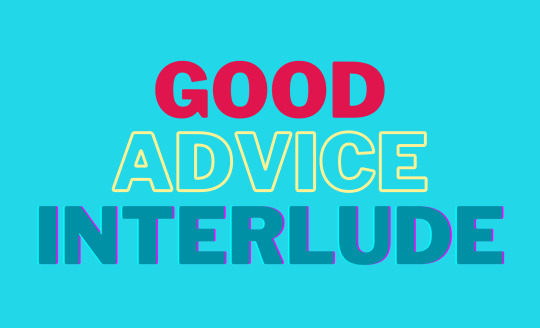
Dear Awkward Anonymous,
It would be so easy to get into a whole deep let's-skeetshoot-therapy-on-the-internet session and try to help a total stranger unpack all of the GA-FUCKING-ZILLION ways in which social awkwardness shows up in a person's life. It seems easy, and it even seems meaningful and worthwhile, but to do so I would have to presume a bunch about your life, and make a bunch of assumptions about the ways in which my own experiences maybe/probably track with yours, and it would be a whole big wank-fest, and frankly ... it would be awkward. I'd be like you, standing there at the party, hoping that what I'm saying resonates or lands or even vaguely tracks with anything a stranger has ever known or experienced, presuming (probably rightly!) that it doesn't, and then flailing and blaming myself when I didn't emerge from the interaction with all the world's gold stars.
So here's what: stop talking to other people as a primary social occupation. Going up to people and just talking is fucking terrifying. The Bad Advisor says this as a Certified Extrovert™ who rarely shuts the fuck up.
Instead, find a thing to do with other people that involves some sort of task or goal or activity. Talk about the thing you're doing together, when you're doing it. If it feels okay, maybe introduce one or two of your own relatable-to-the-activity experiences in the process. See who picks up on it. Ask the people who pick up on it genuinely interested questions in response. This is what we awkward people call: engineering a conversation. It is the way, I am told, humans make connections with other humans. I have seen it work in my own life.
Depending on where you live and your ability level and skill set, I bet you have some options! You could seek out an open board game night, pub quiz session, knitting/quilting circle, or mutual aid meetup that's looking for volunteers. Especially look for social activities with strangers that involve a dedicated, pre-prescribed activity (such as a hiking or mall-walking group, stuffing envelopes for a political candidate or cause you care about, planting trees at your local park, or tasting tea/wine/beer/etc.). (Somebody is going to say join a ballroom dancing club or suchlike; I am personally terrified of this, but if you have a higher tolerance for strangers touching you and fewer than two left feet: it's literally an option. Line-dancing, on the other hand ... absofuckinglutely.)
Even if what's available in your area isn't your precise and specific interest, it might be worthwhile to check out something you are decidedly meh about -- you might not be the only meh person there. You can bond over shit that's boring or shitty with other people who find it boring or shitty! Some of my best friends, arguably my very best friends, came out of experiences we mutually loathed or found at least moderately and mutually miserable.
Consider especially finding an activity where you yourself are the manager of operations and/or have a designated task to take care of that is unique to your position! This doesn't have to be complicated or skill-dependent; can you become a voter registrar in your area? Well, bam! You've got paperwork people have to fill out and a good reason to jibber-jabber with folks who have to ask you the questions. Other ideas: join your local neighborhood association board, become a notary public, or see if your local pet rescue is looking for intake line volunteers. Do you have a trustworthy, especially outgoing friend who might agree to play "social glue" for you a couple of times at their activity-centric events? Make it explicit! Ask them if they'll play friendly wing-person for you at their D&D game, fantasy sports league, or some such.
Alternately: Do you have a unique and fun and shareable skillset you can share with others? Are you pretty good at drawing, programming? Simply a font of endless Merlin or NFL or Real Housewives knowledge? You might start a local Discord or other online social group to discuss and share your interests, then move it to the real world in a few weeks once folks get comfortable. You get the idea.
Most of all: Look for stuff that has more-than-just-talking opportunities available outside the designated group jam for you to maintain connections. Perhaps a group chat, a Discord, a Slack, what-have-you, where you can take more time to consider and draft your responses and posts? Connections with humans get made a thousand ways, and talking raw-dog with strangers is but one.
It takes a true social unicorn to be simply good at talking and only talking to other people. There are some of these one-horned wonders out there, to be sure — but let me assure you that the vast majority of folks want to be accepted and seen just as much as you do, and they're staring at the ceiling at night thinking just as much (more, probably) about all the weird, wonky shit they themselves threw at you than they are anything you ever said to them.
#good advice#good advice interlude#socializing#awkward#introvert problems#shy#shyness#get out there we're all fucking squares
2K notes
·
View notes
Text
"It's easy to lose touch with friends, especially when you live far apart. And sometimes the longer you've gone without speaking to someone, the harder it feels to pick up where you left off. However, a new study suggests that reaching out to pals—especially ones that you have not talked to in a while—is even more appreciated than initially thought.
“People are fundamentally social beings and enjoy connecting with others. Yet, despite the importance and enjoyment of social connection, do people accurately understand how much other people value being reached out to by someone in their social circle?” the study asks. To answer this question, the authors gathered 5,900 participants and put them through a series of experiments.
In one scenario, half of the participants were asked to remember the last time they contacted a friend they had fallen out of touch with, then estimate on a seven-point scale how appreciative the person was (with one being the lowest score, and seven being the highest). Then, the other half of the participants were prompted to recall a time when someone had reached out to them and assign a number to how grateful they were. When these two groups were compared, the researchers found that people greatly underestimated the value of reaching out to someone.
“Across a series of preregistered experiments, we document a robust underestimation of how much other people appreciate being reached out to,” the authors continue. “We find evidence compatible with an account wherein one reason this underestimation of appreciation occurs is because responders (vs. initiators) are more focused on their feelings of surprise at being reached out to. A focus on feelings of surprise in turn predicts greater appreciation.”
In another experiment, participants were told to send a note and small gift to a friend they had not interacted with for a long period of time. They were then asked to estimate on a numerical scale how thankful the person would be because of the contact. Additionally, the receivers of the gifts were asked to rank their feelings upon accepting the gift on the same seven-number scale. Once again, the gift-givers greatly underestimated how much their gesture meant to the other person.
The study concluded that reaching out to people—particularly those that you've lost contact with—is almost always appreciated. It can seem challenging to maintain healthy social interactions, especially due to an increased amount of people working from home and a lack of opportunities. But clearly, the evidence suggests that a little extra effort is worth it.
“For those treading back into the social milieu with caution and trepidation,” the study adds, “feeling woefully out of practice and unsure, our work provides robust evidence and an encouraging green light to go ahead and surprise someone by reaching out.”"
-via My Modern Met, 7/31/22
#friendship#psychology#psych stuff#sociology#social connections#social anxiety#socializing#communication#social networks#good news#hope
5K notes
·
View notes
Text
We ask your questions so you don’t have to! Submit your questions to have them posted anonymously as polls.
#polls#incognito polls#anonymous#tumblr polls#tumblr users#questions#polls about relationships#submitted dec 1#friends#socializing#making friends#social skills#lonely
538 notes
·
View notes
Text
Femme Fatale Guide: Tips To Become More Emotionally Intelligent
Embrace self-awareness & self-reflection: Observe how you feel, behave, and how people generally respond to your words/actions in different situations
Practice self-regulation: Learn to differentiate between your feelings and the actions that would be appropriate in a specific setting or interaction. Internalize that feelings are fleeting and non-factual. You're in control of how you respond/(don't) act on these emotions
Engage in active listening: Pay attention to what others are saying with the intent of understanding, not responding
Focus on emotional differentiation: Understand where your thoughts, feelings, intentions, and opinions end and another person's identity/perception begins
Display radical empathy and acceptance: Understand that almost all people's words and actions result from their own beliefs, past experiences, and current life circumstances/priorities. Put yourself in their shoes when attempting to understand their choices, behaviors, and times they come to you to discuss a problem, success, or major life decision. Accept that you can only control what you do. Very little of other people's actions/the world's workings are personal. Things are happening around you, not to you
Let go of your ego: View yourself as objectively as possible with the potential for improvement. Abolish any superior complex or overwhelming desire to prove your self-importance in others' lives and decisions
Remain open-minded: Question your own beliefs and opinions. Stay curious as to why you believe them to be true/authentic to you. Allow your opinions to change or have the capacity to modify your beliefs upon hearing new information. Understand your worldview and values are valid, but they're not definitively correct beliefs, just because they resonate/feel comfortable for you
Be receptive to feedback: Embrace constructive criticism as a self-improvement tool. Approach it with curiosity and optimism, not as a personal attack
Differentiate between your feelings and capabilities: Your thoughts are not facts. Remember you can do things you don't feel like doing most of the time (work, waking up in the morning, working out, etc.). Learn the difference between being a slave to your emotions and genuinely running out of energy
#emotional intelligence#emotional regulation#emotional maturity#inner work#social skills#socializing#networking#social interaction#emotional resilience#people skills#self improvement#successhabits#glow up tips#femme fatale#dark femininity#dark feminine energy#it girl#high value woman#the feminine urge#queen energy#female power#dream girl#female excellence#high value mindset#life tips#adulting#life advice#femmefatalevibe#communication skills#emotional wellness
1K notes
·
View notes
Text
ADHD & Autism
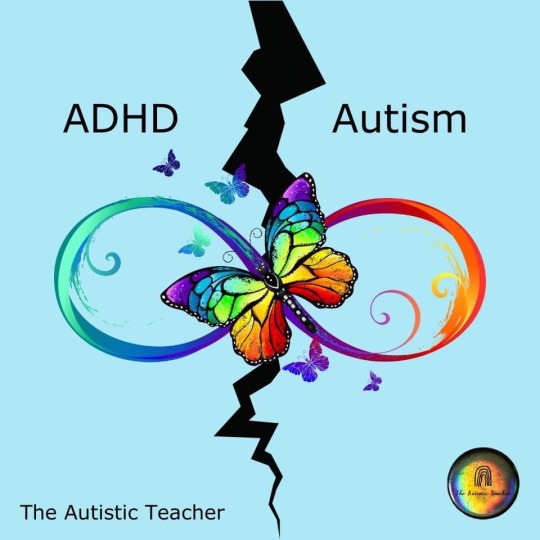

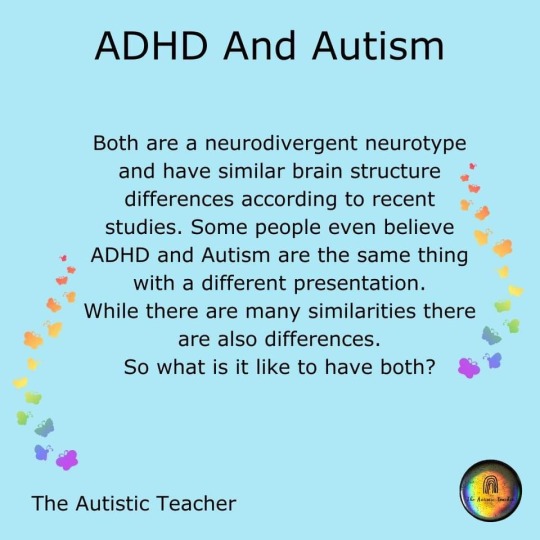




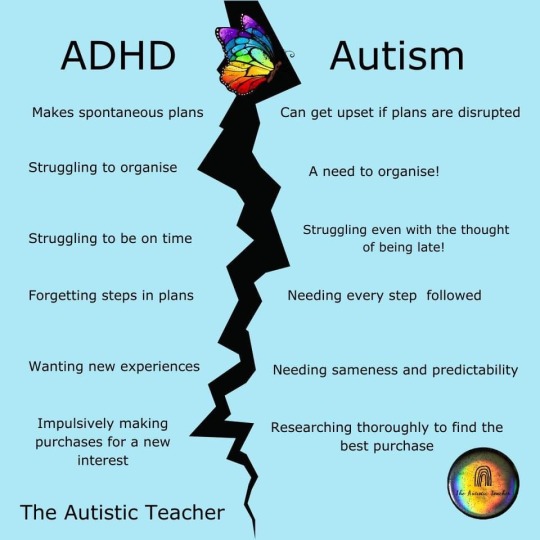
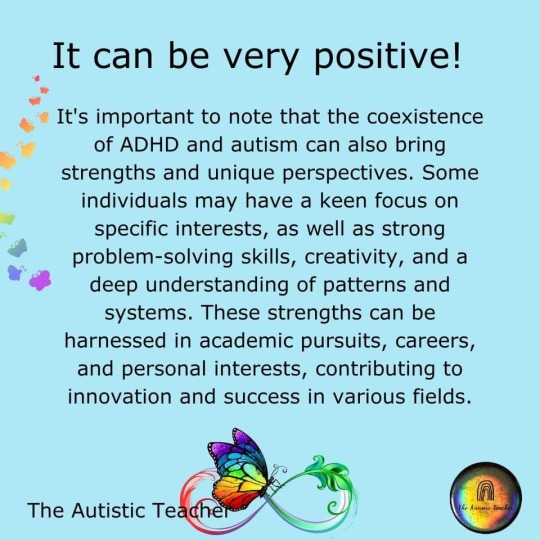
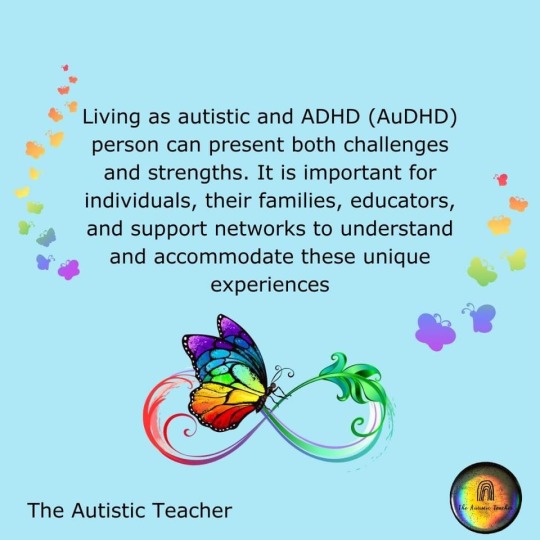
The Autistic Teacher
#autism#actually autistic#adhd#adhd post#adhd & autism#both go together#sensory input#socializing#executive functioning#neurodivergence#neurodiversity#actually neurodivergent#feel free to reblog/share#The Autistic Teacher (Facebook)
561 notes
·
View notes
Text
One of the reasons I believed I couldn’t be autistic for so long was due to a fundamental misunderstanding of my social struggles. This being that I am not by any means incapable of memorizing social rules. Through observation and direction I can construct a broad framework of ‘socially acceptable or not.’ For example, I’m well aware that making physical contact with someone without consent isn’t acceptable. Or that stating blunt facts in a way that implicates someone negatively isn’t allowed. I know to avoid interrupting others if they’re already talking, to not walk away when I’m in the middle of a conversation. Crying, being unusually quiet and frowning indicates sadness. Someone smiling at laughing at what you’re saying means they probably are enjoying their time with you. An increase in speaking volume indicates excitement- either positive or negative. Sarcasm is often indicated by someone saying something absurd that you know they would never say, or you know to be factually wrong.
The fact that I had learned these broad rules made me think autism wasn’t a possibility for me. But being autistic doesn’t stop you from obtaining and applying information. (I mean that’s why so many interventions that ‘treat’ autism do result in the autistic person being able to pass as neurotypical.)
The difference comes from lacking the subconscious nuances and exceptions that come with those broader rules. For example- when is it okay to actually be honest? Some people will not be bothered by physical intimacy- but how would I know this? How can you tell if a group wants you to join in with their conversation? How to tell if this person is smiling and laughing politely or genuinely? How to tell if someone who you know very little about is being sarcastic?
There are not direct, easy to apply ‘rules’ for this, and yet clearly there are ‘right’ options. When the appropriate reaction must be determined by subtle body language or small shifts in tone of voice, ones that are near impossible to teach- I become completely lost.
That’s something I always find lacking with the general social skills advice given. It’s helpful to a point, but the truth is everyone is an individual. People express themselves differently, and react to your same actions differently due to past circumstances or temperaments. There is no one set of rules you can use for everyone, unfortunately. The majority of neurotypicals, while of course having miscommunications and the like, can rely on their subconscious to parse out any subtle changes they might need to make to their demeanor for a particular situation. My brain is much less adept at focusing down broader experience/rules into unique circumstances. (This is actually something that extends past social cues for me and I might make another post talking about it because I think it’s interesting)
Anyway rant over but yeah this was a huge mental barrier to seeking out a diagnosis for a while because at some level I ( ironically enough) took struggling to understand social cues too literally…
#actually autistic#autism#neurodivergent#neurodiversity#autistic#autistic things#autistic traits#autistic thoughts#low support needs#LSN autistic#social cues#socializing#social skills#asd#neurodivergence#autistic experiences#autism spectrum
414 notes
·
View notes
Photo

Would you lock your phone away for 10% off?
#cell phones#mobile phones#smart phones#restaurant#socializing#social experiment#conversation#australia
841 notes
·
View notes
Text
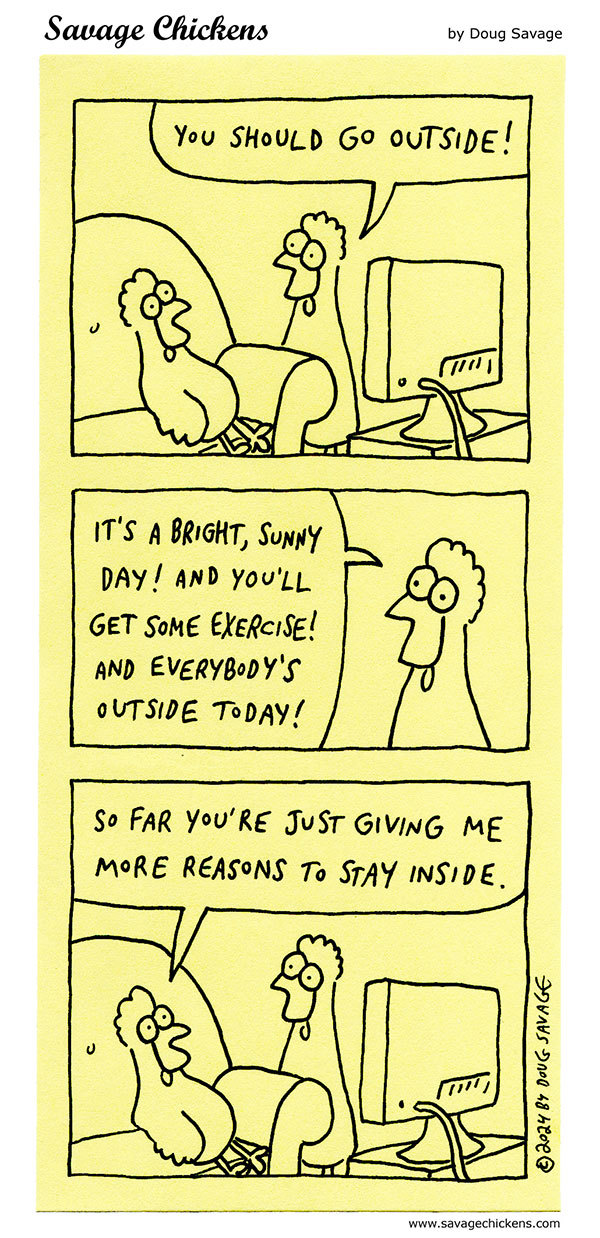
Going Outside.
And more chickens outside.
71 notes
·
View notes
Text
I tried to have friends. I tried very hard. But it never worked out. I just couldn't get along with people.
Anna Biller, from Bluebeard's Castle
#friendless#loner#alone#sad#lonely#odd one out#outsider#socializing#personal#quotes#lit#words#excerpts#quote#literature#anna biller#bluebeard's castle
97 notes
·
View notes
Text
buying things I don’t need to overcompensate for the lack of human connection I have in my life
#pop culture#life#adulthood#mental health#relationships#social anxiety#socializing#trauma#friendships#mental illness
316 notes
·
View notes
Text
so i was talking to my online friend the other day and she caught me off guard that they find it harder to socialize online while for me it was always so much easier so here is the poll because im now really interested
btw im not talking about singular situations like "sending first message to cool mutual" because that a bit stressful for me too, despite finding socializing online being easier for me, just overall experience
please reblog for bigger sample (ෆ˙ᵕ˙ෆ)♡
152 notes
·
View notes
Text
Femme Fatale Guide: Types of Relationships To Help You Thrive In Life
Table of Contents:
Healthy Relationship With Yourself
Peer-To-Peer Relationship
Mentorship Relationship
Goal-Oriented/Accountability-Focused Relationship
Emotionally-Intimate Relationship
Physical/Sexually-Intimate Relationship
Acquaintance Relationships
Second-Degree Relationships
Types of Relationships:
Healthy Relationship With Yourself: Internalize and act with the knowledge that you're worthy of love, care, and nourishment, and have unconditional permission to work towards your goals & dream life. Eat healthfully, drink plenty of water, remain well-rested, move your body daily, maintain proper hygiene/a clean home, invest in your appearance to feel your best, live as a life-long learner, establish healthy habits/routines, get your finances in order, establish and maintain boundaries, make positive self-talk a priority.
Peer-To-Peer Relationship: Aka friendships, which are intended to offer mutual support and joy in life. These friendships thrive on having similar values and interests, which makes these individuals your greatest cheerleaders, advice givers/receivers, and partners in crime to have fun or offer platonic love/emotional support during traditional or difficult seasons in your life. Peer-to-peer relationships should add mutual excitement, encouragement, and emotional nourishment, and provide a soundboard for confidential information exchange, ears to listen without unnecessary or superficial judgment, and solicited advice from someone who has your best interest in mind.
Mentorship Relationship: This could be a boss, teacher, professor, aunt, uncle, or another trusted adult(s) who can guide you based on their more extensive life experience/wisdom. You can have one or several mentors at any life stage and for different purposes. These people should be trustworthy (keep your information confidential unless you state otherwise) and express their advice through the lens of your best interest rather than their own personal desires or biases (at least those left unchecked). Ensure you feel safe around these people, and their presence in your life is a mutually-nourishing relationship that allows you to grow personally, professionally, and relationally.
Goal-Oriented/Accountability-Focused Relationship: A coach, mentorship, or friendship based on the achievement of a particular goal or practice. This type of relationship can manifest as an accountability partner or support group. A therapist can also fulfill this role in your life (but like, a coach, this relationship is a one-way street to offer you emotional support/tools & resources). Some reasons for an accountability-oriented relationship include helping you achieve a certain health/fitness goal, establish better routines, advance in your career, let go of unhealthy habits, patterns, or addictions, better manage your finances, or help you get your other relationships (family, partner, friends, self-talk, boss, co-workers, etc.) in order.
Emotionally-Intimate Relationship: Someone with whom you feel an unwavering emotional closeness and connection. This person can be a partner you're involved with sexually/physically intimate with or not. Asexuality exists, of course. And emotional intimacy can definitely exist in close platonic relationships (like your best friendships) without any romantic or sexual feelings. These relationships are important because they allow you to let your emotional walls down and be your vulnerable, authentic self.
Physical/Sexually-Intimate Relationship: This relationship could be with a romantic partner, FWB, with multiple partners, purely with yourself, or somewhere in between. If you have sexual needs, it's important to find pleasurable ways to satisfy these desires in a way that makes you feel most fulfilled and respected. Let go of any shame you experience when exploring this side of yourself. Experiment and learn what you like/dislike/fantasize about. Use this information to elevate your practice and communication with any partner(s) for a heightened, more enjoyable, and potentially closer emotionally-bonding experience.
Hobby/Interest-Centric Relationship: These relationships can extend from co-workers to your friends in a certain class/the one friend you go on weekly walks with, follow a particular TV show with, exchange beauty tips with, "going out" friends, etc. While these connections aren't vulnerable to the degree of a close friendship/relationship, it is important to have some relationships that are purely based on fun, light-hearted conversations, and mutual hobbies/interests/lifestyles. Having someone to share these mutual experiences with helps you feel more connected to your environment/communities, not feel isolated/lonely when your friends, family, or intimate partner has different hobbies, career aspirations, or daily routines/lifestyle compared to you, and provides a mutual soundboard on issues, insights, and exciting moments in this particular area of your life.
Acquaintance Relationships: Everyone needs those friends, co-workers, or classmates they can just chat with when at a party, a group meeting, dinner, a special occasion, to grab a quick lunch or coffee, etc. These people are fun to be around and allow you to indulge in light, easy conversations to offer temporary social support/fulfillment. These relationships also expand your network for professional opportunities, making new friends, finding dates/a potential partner, interest groups/new hobbies, referral services/classes/spaces, and other contacts that can enrich your life.
Second-Degree Relationships: These are friend-of-a-friend type connections who can be/become your future business partners, romantic/sexual partners, co-workers, investors, hairdressers, realtors, stylists, finance managers, etc. Be ready to reciprocate these offers and be this person in others' lives, too. As your network gets broader and more dynamic, better chances and potential there is to connect with the right people to help you achieve your goals, desires, and overall life satisfaction. Success and efficiency rarely – if ever – exist in isolation.
#relationships#interpersonal relationships#networking#making friends#dating#social interaction#socializing#social connections#interpersonal skills#communication skills#networking opportunities#social networks#life advice#glow up tips#glow up era#level up journey#femme fatale#higher self#it girl#high value woman#high value mindset#success mindset#healthy lifestyle#successhabits#female excellence#dream girl#queen energy#female power#femmefatalevibe
745 notes
·
View notes
Text
The Autistic Struggle of Receiving Gifts and Trying to Find the Right Facial Expression…

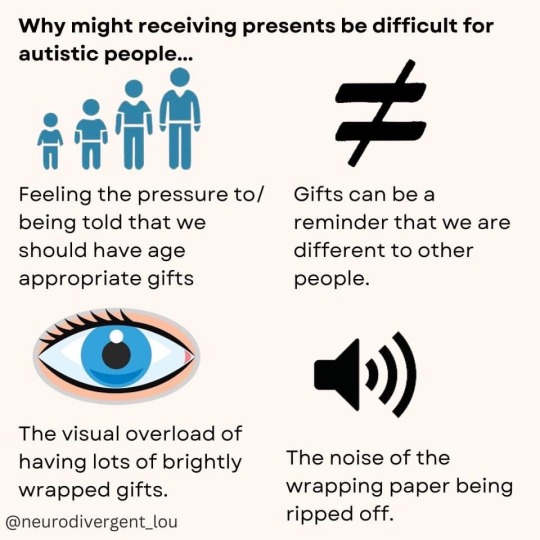

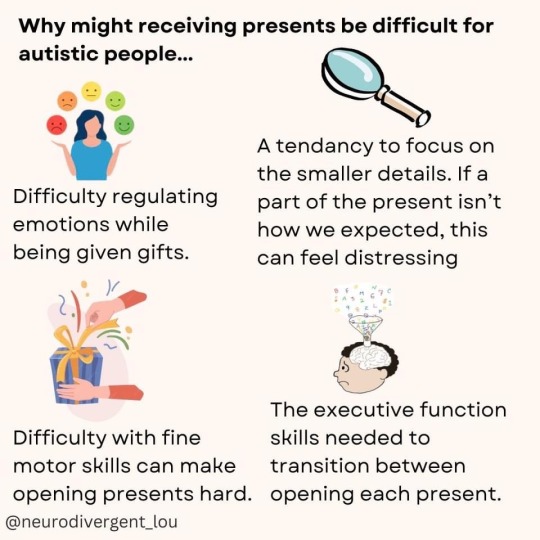

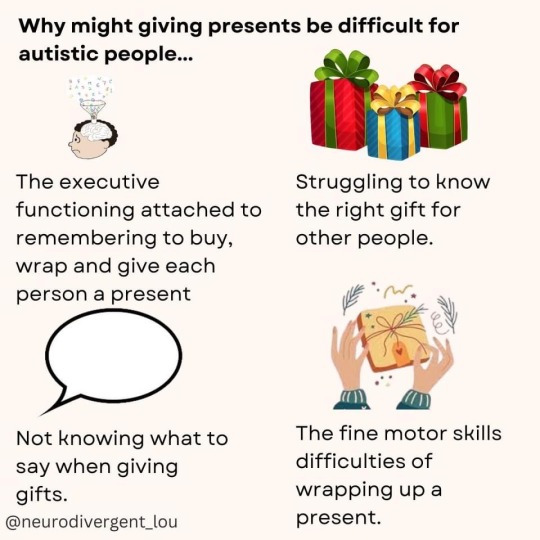

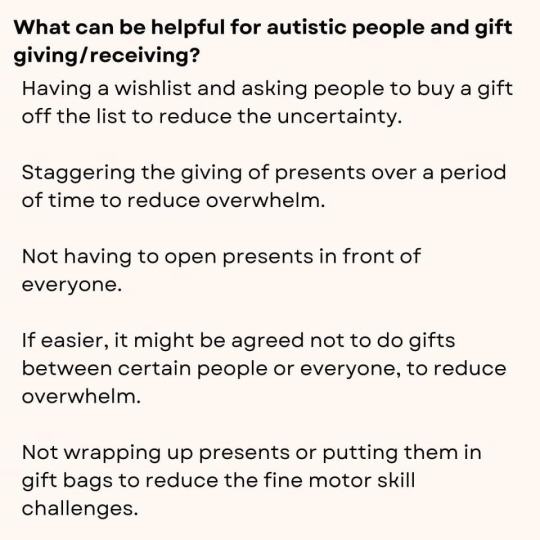

Neurodivergent_lou
#autism#actually autistic#autism and gift giving#Christmas#happy holidays#have fun this holiday#socializing#neurodivergence#neurodiversity#actually neurodivergent#feel free to share/reblog#Neurodivergent_lou (Facebook)
485 notes
·
View notes
Text
It’s really hard for me to tell if someone is mad at me or not. If someone changes the way they interact with me for any reason- even if it’s completely unrelated to me, my first assumption is going to be that they’re upset. And this stresses me out super badly because I don’t know what I did. If I did something to hurt you I want to be confronted with it right away, because chances are it wasn’t intentional. I don’t want that shit to fester.
So this fear means I’ll interpret pretty much anything as being upset with me, especially if I feel like I might have said something stupid recently. I’m overly sensitive to any shifts in socialization , but I’m not able to parse what these changes mean. All I can do is ask “are you mad at me?” To seek reassurance, but I know that’s also not a complete solution. People don’t like it when you constantly pester them about how they’re feeling about you.
#actually autistic#neurodivergent#autistic#autism#social cues#socializing#neurodiversity#autistic things#autistic experiences
267 notes
·
View notes
Text
Had a tik tok in my Facebook memories that said something about how with anti-maskers it ultimately comes down to them perceiving doing things for others as weakness since they grew up in a hyper-individulistic society. It's them exerting autonomy and refusing to stop under peer pressure, largely just for the sake of fighting something since that's a strength. A value. "I don't let others tell me what to do because I can't be controlled"
Made me think that everyone else bought into the same type of individualistic rhetoric through pop psychology: having "good" boundaries means never needing others and always putting yourself before everyone else regardless of circumstance and especially if they make you feel any feeling you don't want to feel. ...Like guilty for not caring enough to keep wearing a mask in 2023. That's a strength. A value. "I don't let others tell me what to do because I love myself"
The conclusion here being: being needed/needing others is a threat to your autonomy which is a Value to protect.

And when you really think about it applies to more than masking; supporting BIPOC, watching the news, showing up to protests, etc.
"I'm already depressed, I can't handle it. I'm watching out for my own mental health by not participating"
"it's all woke which makes me feel like a bad person cuz Im a bigot so I only watch what validates my bias"
And personally I get a little suspicious when two sides defined by their opposite social values come to the same social conclusion.

You should too. This rhetoric is holding us back. Individualism is holding us back. People need people. It's not toxic or abusive or manipulative to admit that, no matter how much society has tried to make you believe otherwise.
Oppressed people needing allies and your friends who need help moving aren't violating your boundaries or "bad for your mental health" just because You don't want to show up AND not feel bad about it.
Can the generation that grew up screaming "I don't know how to teach you that you should care about other people" at boomers please stand up and take a heaping tablespoon of your own medicine.
And then show gen z how to swallow it because growing up in the social climate we millennials curated online hasn't exactly inspired feelings of confidence in others or the future.
Both of which we still care about right? We still care about other people and the future? Not just ourselves?
Just want to confirm that we haven't gone Full Boomer as a collective yet cuz at this rate I wouldn't be surprised if someone responded saying that being expected to care about their friends is akin communist dictatorship
And could this be a Red Scare Psyop meant to discourage you from finding community, collectivism, and mutual aid in a time where your hyper-individulistic behavior and beliefs are being exploited for record breaking profits in the name of capitalism?

#remembering that thing I shared awhile ago where OP was talking about their friends calling it Traumadumping when OP talked-#about having a shitty few days. like??????#sometimes friends are unhappy or even depressed and they shouldnt have to hide that from friends sry not sry#most times they way you feel when they're talking are just NORMAL feelings of empathy and sympathy and sad and mad for them#Yeah the ppl around you will have an affect on you-the answer for dealing with this is building your emotional IQ NOT isolation#they need you as much as you need them actually#liberals#self care#society#lgbt#mutual aid#capitalism#biden#covid#masking#healthcare#social justice#socializing#boundries#pop psychology#sometimes you will be uncomfortable and that's OKAY#THATS GOOD
170 notes
·
View notes
